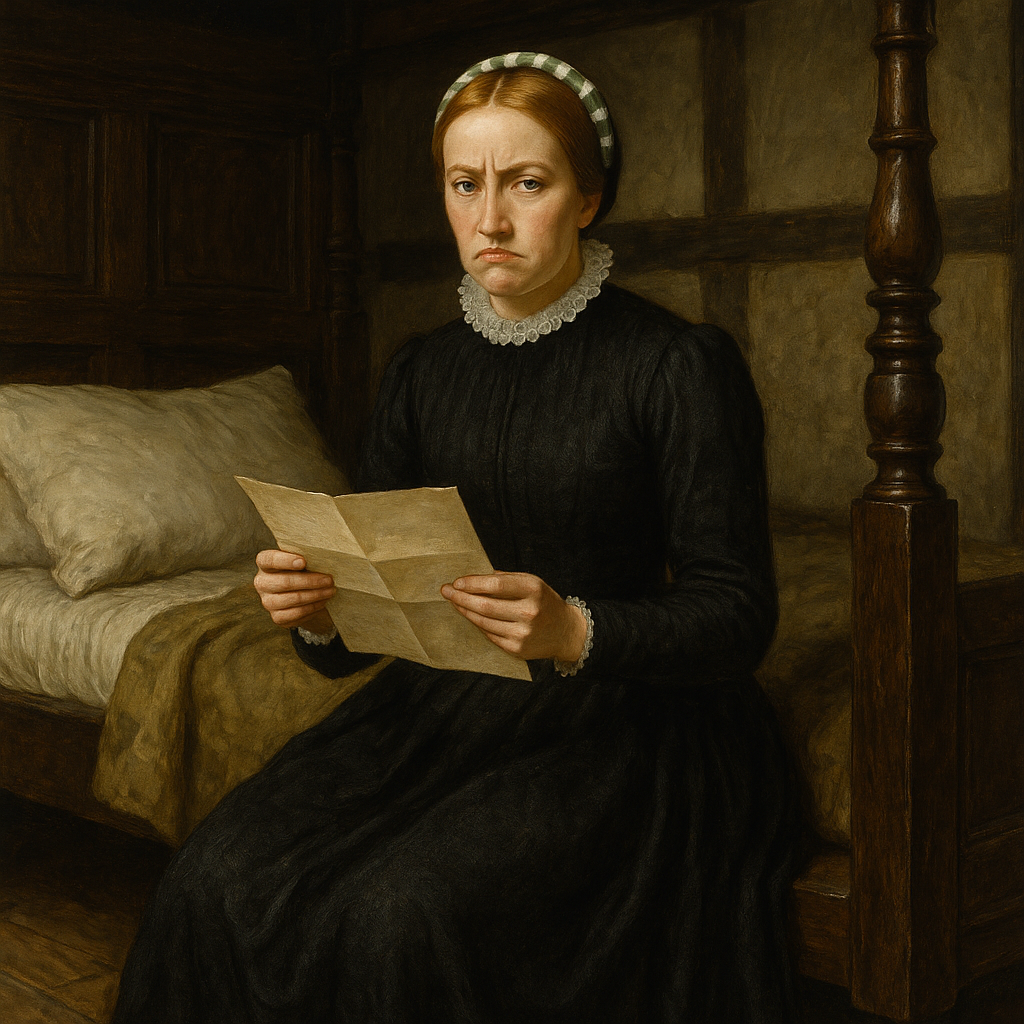The Best Will in the World? 📜🪶☠️🏆

Testaments as love notes, pranks, institutions — and the occasional drawing‑room mystery.
⚠️ Fair warning - post is ~40% AI slop ⚠️
I wrote my own will recently and afterwards I felt oddly buoyant... more alive, you might even say. It turns out a will isn’t just paperwork; it’s a final short story. My own will has a few bequests but you'll have to stay a night in a haunted house if you want to know more. And I don't plan on that being any time soon. In the meantime, it got me wondering who has the best will in the world?
First, terms. If “best” means most generous, then we ought to start with plutocrats who turned private fortunes into public goods. But billionaires are never the best people, even in death. So perhaps the “best” ought to mean most imaginative, most mischievous, or most consequential: the clauses that redrew borders, or the readings that could ignite an Agatha Christie plot.
So, who is winning at death?
Shakespeare’s line that launched a thousand essays
On 25 March 1616, William Shakespeare signed a perfectly workmanlike will — except for the one sentence everyone remembers:
Item I gyve unto my wief my second best bed with the furniture.
Was that a snub or a valentine? The “best” bed in Elizabethan homes was often a showpiece for guests; the “second‑best” was probably the marriage bed, which makes the bequest intimate rather than stingy. Scholars still argue, which is exactly why the line lives. See the overview from the Shakespeare Birthplace Trust and the UK National Archives edition of the will.
There’s also a paleographic bonus: Shakespeare’s will bears three of the only six authenticated Shakespeare signatures — one on each of the three sheets — while the body text is in a scribe’s hand. For signature images and context, see the National Archives and the Folger Shakespeare Library.
In the interests of immortality, I'm not telling you who gets my second best bed. And, certainly not, why they deserve it!
From bonfires to steamrollers: the literary counter‑tradition
Shakespeare’s “bed” is coy. Other writers were explicit.
- Virgil supposedly wanted the unfinished Aeneid destroyed; Augustus overruled him and Western literature kept its Roman epic.
- Franz Kafka instructed Max Brod to burn his manuscripts; Brod disobeyed, and the modern canon (and years of legal wrangles) ensued.
- Sir Terry Pratchett asked for his incomplete work to be physically destroyed — and in 2017 a vintage steamroller named Lord Jericho flattened the hard drive at a country fair.
- George Bernard Shaw tried to engineer the future with a bequest for a phonetic alphabet; litigation followed, but we did get a Shavian alphabet and a phonetic edition of Androcles and the Lion.
Here the issue is less the disbursements and distributions; it is loquacious and imaginative artist wanting the last word on their legacy.
Wills that built the world we live in
Some testaments didn’t make good stories so much as permanent institutions.
- Alfred Nobel’s will (1895) endowed prizes in science, literature and peace; after legal tussles, the first awards arrived in 1901. The prize is generous but the honour is greater. The Nobel is the Prize. And its greatest effect has no doubt been in the efforts it has inspired in thousands of egotistical scientists striving for the ultimate accolade. (Carl Djerassi's novel Cantor's Dilemma is great on this.) Writers (and Bob Dylan) realise their chances were more a lottery so the cool ones decline it or ignore. The Peace Prize killed satire. And, of course, we all know that Economics is not a Nobel pursuit.
- Sir Henry Wellcome’s will (1936) created the Wellcome Trust, now among the world’s richest research funders (portfolio ~£37.6bn; charitable spend ~£1.6bn in 2023/24). They got all his nick-nacks too which became the basis for the Wellcome Collection. He was an irredemable hoarder and colonial plunderer. At his death in 1936 his collection was about a million objects. Only a quarter of which had been catalogued. It included lots of gross medical stuff, human remains and over 500 gynecological speculae and a similar number of enema syringes. TBH, I don't think his heirs were too fussed about missing out.
- Andrew Carnegie’s foundations sustained his lifetime philosophy of the "Gospel of Wealth" He created 2,500 Carnegie public libraries that remain brick‑and‑mortar memorial to his good work. But he was the worst boss, exploiting his workers terribly to be able to do more of his 'good works'. Preaching peach while profiting massively from war.
How do you get Carnegie Hall? Parasite.
- The MacArthur Foundation began on paper in 1970 and was supersized by John D. MacArthur’s 1978 will, which steered ~92% of his estate (about $1bn) into the foundation and even named the inaugural board; the Fellows ("genius grants") launched in 1981. I love these more than the Nobels. No strings grants across a huge breadth of endeavours on the basis of early promise rather than immortal achievement. I make a point to read all the biographies every year.
(Though here, I must declare an bias. My full name is Caspar John MacArthur Addyman - no relation, no inheritance.) - Warren Buffett has pledged >99% of his wealth to philanthropy “during my lifetime or at death,” pairing plain mechanics with outsized, ongoing gifts. It's huge and unshowy, but he's taking his sweet time. In 2024 there were plenty of headline about his measly $5.3 billion donation to charity, he still had another $129 billion in the bank. He's 94 years old...
The prankster’s crown: Charles Vance Millar, Esq.
For sheer mischievous elegance, the laurels go to Charles Vance Millar (1854–1926), a Toronto lawyer‑financier and connoisseur of loopholes. He died unmarried, childless — and left a will that was part satire, part social experiment as his biography shows.
The famous Clause Ten created the Great Stork Derby: ten years after his death, the Toronto woman with the most babies would inherit the residue of his estate (ties split the pot). The courts upheld it, the newspapers feasted on it, and in 1938 four mothers with nine children each received $110,000 apiece; two others settled for smaller sums in the Great Stork Derby saga.
Millar’s deep cuts are even better:
- He left O’Keefe Brewery stock — Catholic‑owned — to Protestant ministers and Orange Lodges, if they would accept dividends — see the colourful bequests.
- He left Ontario Jockey Club shares to anti‑gambling crusaders and to a man who loathed the Club; he gifted a Jamaica holiday home in joint tenancy to three lawyers who despised one another on condition they live there together — spelled out in Millar’s bequests.
Not the kindest will — but the funniest with real teeth.
The Christie segue: real‑world intrigue with drawing‑room manners
Christie knew: a will is motive distilled. Real life rarely ends in blood on the Aubusson, but the vibe — solicitors’ offices, sealed envelopes, competing heirs — recurs.
- The Tichborne Claimant (1860s–1870s): a vanished heir, a claimant from Australia, and a Victorian cause célèbre in which half the country wanted to believe. Trials, testimonies, ruin: everything but Miss Marple — the Tichborne case.
- Howard Hughes’ “Mormon Will” (1976): a handwritten testament surfaced in Salt Lake City, gifting slices of the empire to various parties and to Melvin Dummar, a gas‑station attendant who claimed to have given Hughes a lift. A Nevada jury called it a forgery; Dummar got nothing—and the Nevada case history reads like a courtroom novella.
Hovering in the background is the forfeiture rule — the elegant, very Christie‑esque principle that no one should profit by a death they unlawfully caused. English law still applies (and sometimes tempers) it, as the Law Commission sets out.
Lucky pets and other codicils of delight
- Trouble the Maltese (Leona Helmsley) was left $12m until a court trimmed it to $2m; the rest went to charity, as reported at the time.
- Tommaso the former stray cat in Rome ended up with €10m in property — via a human trustee, because Italian law won’t let animals inherit directly, a quirk highlighted when the story made headlines.
- If you hear about Gunther the German shepherd “inheriting a countess’s millions”, know that the backstory has repeatedly been outed as a long‑running publicity confection.
Render unto Caesar: Wills that changed the map
A few testators didn’t just endow galleries; they handed over kingdoms.
- Attalus III of Pergamon (133 BCE) willed his realm to Rome; rebellion, then annexation followed. One clause, a new Roman province.
- Nicomedes IV of Bithynia (74 BCE) left his crown to Rome, helping spark the Third Mithridatic War and birthing a fresh provincial map.
- Ptolemy Apion (96 BCE) bequeathed Cyrenaica to Rome; it was duly absorbed into Rome.
When we say some wills changed the world, we sometimes mean that literally.
So — who wrote the best will?
It depends what you mean by best.
- If you mean most consequential, my vote is Alfred Nobel: concise, controversial, culture‑shaping every year. Though John MacArthur's Genius grant are also a gift that keeps giving and arguably make a greater impact on the world. Scientists strive for the Prize.
- If you mean biggest public‑good flywheel, Henry Wellcome: a governance machine that funds curiosity at scale. Carnegie's libraries are an amazing public good but he's a total bastard. Buffet could possible do more good if he just died already. But Buffet is never short term about anything
- If you mean most entertaining, it’s Charles Vance Millar by a mile, for writing a will that became a decade‑long citywide plot.
- If you mean clearest line in the sand for art, Terry Pratchett (steamroller) beats Kafka (bonfire) on the simple basis that one was honoured.
- And if you mean most argued‑over single sentence, Shakespeare is the still immortal bard.
But perhaps the best will is the one that sounds most like its maker. Wills are tiny autobiographies. Some speak in benefactions, some in jokes, some in rules for the future, some in a single line to a lifelong companion.
Epilogue: how to write one you won’t be embarrassed to haunt
Say what matters in one plain paragraph (Nobel/Buffett), then make the mechanics simple. If you’re a maker, decide — publish or pulverise (Pratchett/Kafka) — and appoint an executor who will actually do it. If you want a wink from beyond the veil, keep it kind (Millar’s prank was brilliant and also… fraught). And if you love someone, it doesn’t take more than a sentence. Sometimes not even the best bed.
The MacArthur Codicil
To whom shall I leave this marvellous jacket?


Tailored Exclusively for the sales leader who marched for me in '74. JOHN MacARTHUR
Found in a charity shop in Barcelona in 2009 for 10 Euros. I spotted it because it was my family tartan. I was then amazed to discover it had my middle name and year of birth on the label. And even more delighted when it fitted perfectly.
From what I've been able to discover, these were given by MacArthur to many of his best insurance salesmen. Somewhat mundane in its birth but an absolute delight to me in its afterlife. And, let's face it, the closest I'll ever get to a genius grant.
Copyleft, Caspar Addyman 2025
Written with frustrating assistance of GPT-5.
Bibliography / Links
- Shakespeare’s will context & quote: Shakespeare Birthplace Trust — “What did Shakespeare leave his wife?” https://www.shakespeare.org.uk/explore-shakespeare/blogs/what-did-shakespeare-leave-his-wife/
- Shakespeare’s will (images, signatures): UK National Archives — “Shakespeare’s will” https://www.nationalarchives.gov.uk/education/resources/shakespeare-will/
- Folger context on the will: https://folgerpedia.folger.edu/Shakespeare%27s_will
- Virgil — Britannica: https://www.britannica.com/biography/Virgil
- Kafka & Brod — National Library of Israel: https://blog.nli.org.il/en/kafka_brod/
- Terry Pratchett’s steamroller — BBC: https://www.bbc.com/news/uk-england-somerset-41035809
- Shaw’s will — Shaw Society: https://shaw.org/shaws-will/
- Shavian alphabet resource: http://www.shavian.info/
- Nobel’s will — Nobel Prize: https://www.nobelprize.org/alfred-nobel/alfred-nobels-will/
- Wellcome Trust — Annual report 2023: https://wellcome.org/reports/annual-report-and-accounts-2023
- Carnegie libraries — Carnegie Corporation: https://www.carnegie.org/interactive/story-of-the-carnegie-libraries/
- Tate history: https://www.tate.org.uk/about-us/history-tate
- Rhodes Trust — Scholarship page: https://www.rhodeshouse.ox.ac.uk/scholarships/the-rhodes-scholarship/
- MacArthur Foundation — History: https://www.macfound.org/about/our-history
- NYT obituary on John D. MacArthur: https://www.nytimes.com/1978/01/08/archives/john-d-macarthur-80-billionaire-dies.html
- Berkshire Hathaway — Buffett letters: https://www.berkshirehathaway.com/letters/letters.html
- NYT report on Buffett donations (example 2024): https://www.nytimes.com/2024/11/21/business/warren-buffett-donation.html
- Charles Vance Millar — overview: https://en.wikipedia.org/wiki/Charles_Vance_Millar
- Great Stork Derby — overview: https://en.wikipedia.org/wiki/Great_Stork_Derby
- Tichborne Case: https://en.wikipedia.org/wiki/Tichborne_case
- Howard Hughes “Mormon Will” — Britannica: https://www.britannica.com/biography/Howard-Hughes/Controversies
- Nevada Courts summary of the “Mormon Will” case: https://nvcourts.gov/aoc/judicial-history/historical-cases/howard-hughes-mormon-will-case
- Forfeiture rule — Law Commission: https://www.lawcom.gov.uk/project/forfeiture-and-law-of-succession/
- Helmsley’s dog “Trouble” — NYTimes: https://www.nytimes.com/2008/06/27/nyregion/27helmsley.html
- Tommaso the cat — BBC: https://www.bbc.com/news/world-europe-16260764
- Gunther hoax — BBC: https://www.bbc.com/news/world-europe-59531527
- Attalus III: https://en.wikipedia.org/wiki/Attalus_III
- Nicomedes IV: https://en.wikipedia.org/wiki/Nicomedes_IV_of_Bithynia
- Ptolemy Apion: https://en.wikipedia.org/wiki/Ptolemy_Apion
